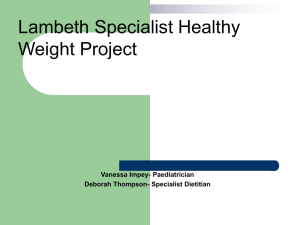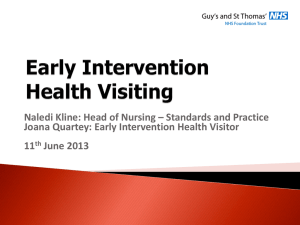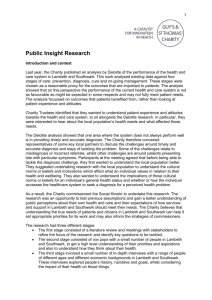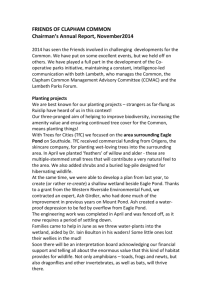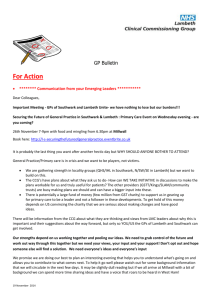Attachment - Lambeth School Services
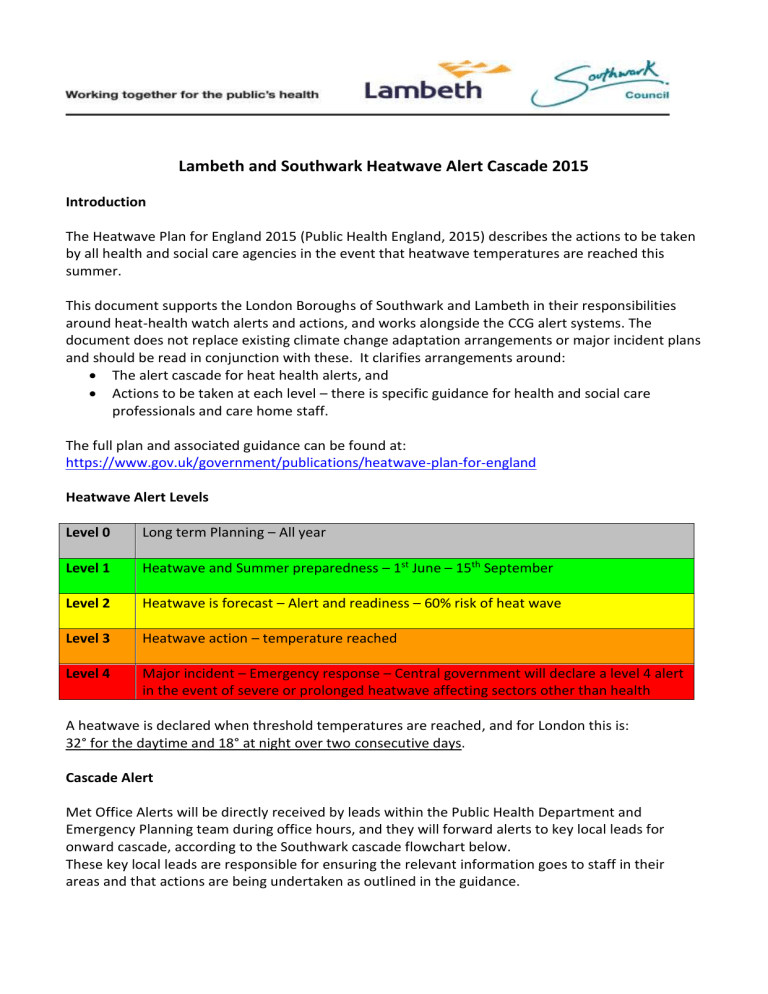
Lambeth and Southwark Heatwave Alert Cascade 2015
Introduction
The Heatwave Plan for England 2015 (Public Health England, 2015) describes the actions to be taken by all health and social care agencies in the event that heatwave temperatures are reached this summer.
This document supports the London Boroughs of Southwark and Lambeth in their responsibilities around heat-health watch alerts and actions, and works alongside the CCG alert systems. The document does not replace existing climate change adaptation arrangements or major incident plans and should be read in conjunction with these. It clarifies arrangements around:
The alert cascade for heat health alerts, and
Actions to be taken at each level – there is specific guidance for health and social care professionals and care home staff.
The full plan and associated guidance can be found at: https://www.gov.uk/government/publications/heatwave-plan-for-england
Heatwave Alert Levels
Level 0 Long term Planning – All year
Level 1 Heatwave and Summer preparedness – 1 st June – 15 th September
Level 2 Heatwave is forecast – Alert and readiness – 60% risk of heat wave
Level 3 Heatwave action – temperature reached
Level 4 Major incident – Emergency response – Central government will declare a level 4 alert in the event of severe or prolonged heatwave affecting sectors other than health
A heatwave is declared when threshold temperatures are reached, and for London this is:
32° for the daytime and 18° at night over two consecutive days.
Cascade Alert
Met Office Alerts will be directly received by leads within the Public Health Department and
Emergency Planning team during office hours, and they will forward alerts to key local leads for onward cascade, according to the Southwark cascade flowchart below.
These key local leads are responsible for ensuring the relevant information goes to staff in their areas and that actions are being undertaken as outlined in the guidance.
Actions to be taken at each heatwave alert level and by each staff group are clearly laid out in the full plan and associated guidance (see link above). In summary, the main areas for action are:
Raising awareness among staff and service users prior to a heatwave being declared
Supporting vulnerable people during a heatwave, including daily telephone calls or visits to those individuals most likely to be affected.
Monitoring Care & Nursing Home residents closely
Ensuring equipment is functioning properly and buildings can be kept as cool as possible
Key public health messages
Stay out of the heat:
Keep out of the sun between 11.00am and 3.00pm.
If you have to go out, walk in the shade, apply sunscreen and wear a hat and light scarf.
Avoid extreme physical exertion and wear light, loose-fitting cotton clothes.
Cool yourself down:
Have plenty of cold drinks and avoid excess alcohol, caffeine and hot drinks.
Eat cold foods, particularly salads and fruit with a high water content.
Take a cool shower, bath or body wash or sprinkle water over the skin or clothing.
Keep your environment cool:
Keeping your living space cool is especially important for infants, the elderly or those with chronic health conditions or who can’t look after themselves
Place a thermometer in your main living room and bedroom to keep a check on the temperature.
Keep windows that are exposed to the sun closed during the day, and open windows at night.
If possible, move into a cooler room, especially for sleeping.
Electric fans may provide some relief, if temperatures are below 35°C.
Look out for others:
Keep an eye on isolated, elderly, ill or very young people to esnure they are able to keep cool.
Ensure that babies, children or elderly people are not left alone in stationary cars.
Be alert and call a doctor or social services if someone is unwell or further help is needed.
If you have a health problem:
Keep medicines below 25 °C or in the refrigerator (read storage instructions on the packaging).
Seek medical advice if you are suffering from a chronic medical condition or taking multiple medications.
If you or others feel unwell:
Try to get help if you feel dizzy, weak, anxious or have intense thirst and headache; move to a cool place as soon as possible and measure your body temperature.
Drink some water or fruit juice to rehydrate.
Rest immediately in a cool place if you have painful muscular spasms (particularly in the legs, arms or abdomen), and drink oral rehydration solutions containing electrolytes.
Medical attention is needed if heat cramps last more than one hour, if you feel unusual symptoms or if symptoms persist.
Lambeth Heatwave Alert Cascade 2015
The following alert cascade will be initiated in Lambeth if the Met Office declares Levels 2, 3 or 4 and a full contact list can be found below:
Public Health England
GPs &
Pharmacies
NHS England
(South London on call
Manager)
Heatwave alert level
2, 3 or 4
Lambeth Council
(Emergency Planning Team & Public Health Team)
On call staff
Lambeth Clinical Commissioning Group
Via usual surge management routes
CCG Staff
Guys & St Thomas’ Trust
(Surge management leads)
Kings Hospital Trust
(Surge management leads)
South London & Maudsley
Mental Health Trust
(Surge management leads)
Care & Nursing Homes
(via Lambeth Council)
Community Providers
(Surge management leads)
Children’s
Services
Children’s
Social Care
Children’s placements
Schools
Adult Services
Adult Social
Care
Adult Day
Care Centres
Residential
Homes
Voluntary
Orgs
Senior
Management
(Level 3 and above only)
Careline24
Housing out of hours
Careline24
Alarms & equip
Comms Team
All staff
Website
Media updates and events
Contact List – Lambeth
Cascade Group
Public Health
Lead Name
Ruth Wallis
Emma Robinson
Emergency Planning
Team
Sarah Robinson
Jo Couzens
Rachael Akanbi
Careline24 Carline Francis
Adult Services
Children’s Services
Myrtle Bernard
David Bello
Lisa Humphreys
Communications
Lambeth CCG
Peter Compton
Colm Doyle
Stuart Dixon
Bob Bielby
Katie Gibbons
Lee Fiorentino
Julian Ellerby
Marion Shipman
Peter Barnard
Bisi Aiyeleso
Liz Clegg
Sarah Bryan
Position or Department Will cascade to Email
Director of Public Health
Consultant Health Protection
Health Protection Manager
Emergency Planning
Careline24 Lead
LB Lambeth social care, head of service (health)
Head of Adult Social Care
Children’s Social Care
Special Education Needs
Schools
Commissioning lead (EAP)
LSCB
Head of Campaigns
Head of Events
LB Lambeth, head of comms
Lambeth CCG, AD – governance and quality
SEL CCGs
All email addresses on this list for onward cascade
On call staff
Senior Management (Levels 3 &
4 only)
Careline24
Emergency Housing (out of hours)
Adult Social Care Teams
Adult provider agencies
Children Social Care
Children’s providers
Children’s placements
SEN Transport
Schools
Ruth.wallis@southwark.gov.uk
Emma.robinson@southwark.gov.uk
Sarah.robinson@southwark.gov.uk
jcouzens@lambeth.gov.uk rakanbi@lambeth.gov.uk
kpeters-bean@lambeth.gov.uk
cdfrancis@lambeth.gov.uk
mbernard@lambeth.gov.uk
dbello@lambeth.gov.uk
Comms & campaigns
Events
CCG Commissioned services
CCG staff lhumphreys@lambeth.gov.uk
mdonkor@lambeth.gov.uk
kavis@lambeth.gov.uk
ayarnold@lambeth.gov.uk
chastie@lambeth.gov.uk
knugent@lambeth.gov.uk
PCompton@lambeth.gov.uk
CDoyle@lambeth.gov.uk
SDixon@lambeth.gov.uk
bbielby@lambeth.gov.uk
communications@lambeth.gov.uk
events@lambeth.gov.uk
Marion.shipman@nhs.net
sarahbryan1@nhs.net peter.barnard1@nhs.net bisi.aiyeleso@nhs.net l.clegg @nhs.net
